LSBM100: Essay on Information Systems, ERP, and Business Impact
VerifiedAdded on 2023/01/12
|10
|2562
|42
Essay
AI Summary
This essay delves into the crucial role of Information Systems (IS) and Enterprise Resource Planning (ERP) in contemporary business environments. It begins by defining IS and its categories, including Transaction Processing Systems (TPS), Management Information Systems (MIS), and Decision Support Systems (DSS), illustrating their functions and applications within a company like IBM. The essay then provides an in-depth analysis of ERP systems, highlighting their benefits such as integrated departmental functions, improved decision-making, increased efficiency, and enhanced data security. Real-world examples and recommendations are also provided to guide businesses in effectively implementing and utilizing these systems to achieve competitive advantages. The analysis emphasizes the importance of strategic planning and market research to ensure the appropriate use of these technologies, ultimately leading to improved productivity, profitability, and streamlined operations. The essay concludes with a summary of the key findings and the significance of managing information effectively in the business sector.

ESSAY
Paraphrase This Document
Need a fresh take? Get an instant paraphrase of this document with our AI Paraphraser
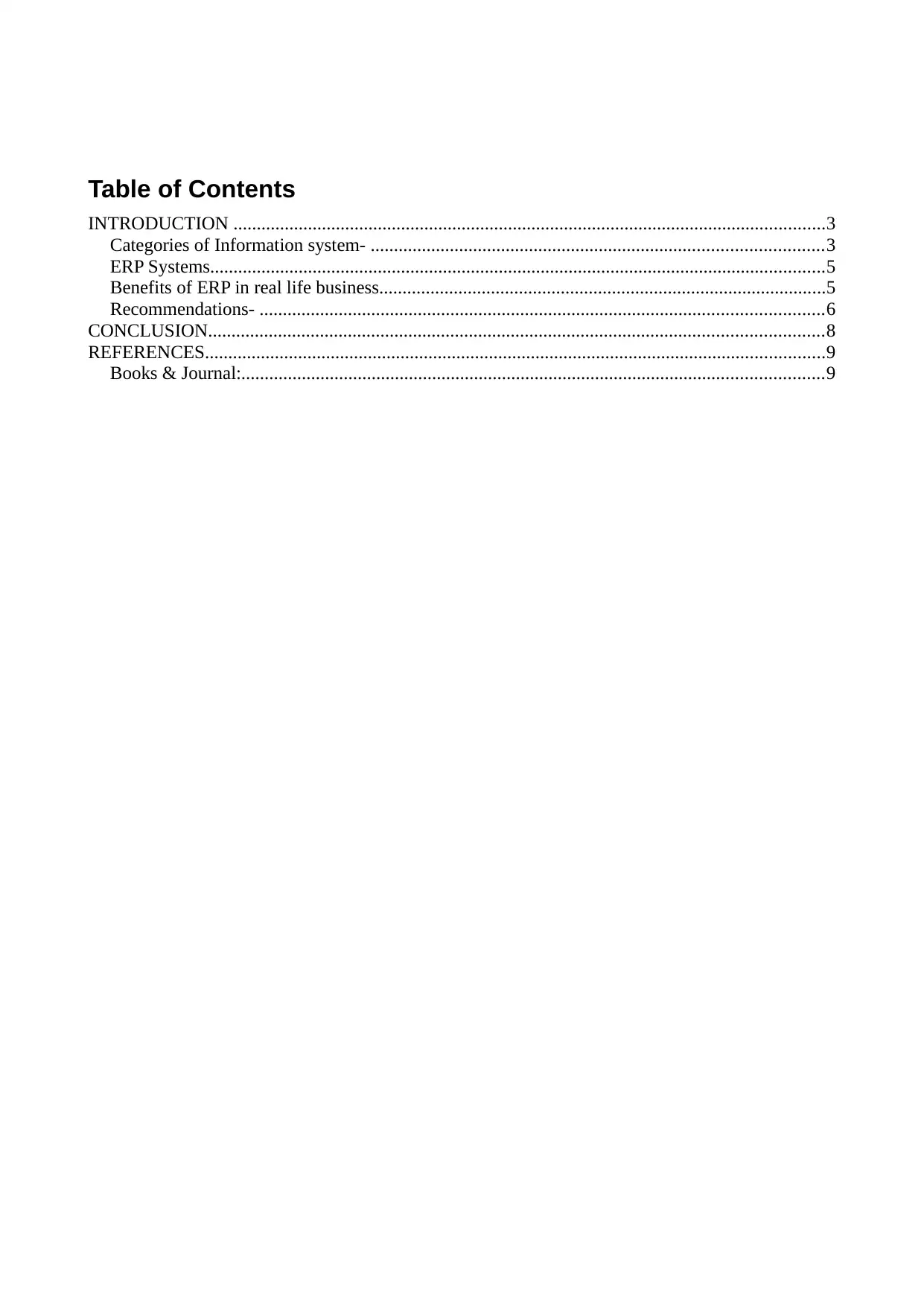
Table of Contents
INTRODUCTION ...............................................................................................................................3
Categories of Information system- .................................................................................................3
ERP Systems....................................................................................................................................5
Benefits of ERP in real life business................................................................................................5
Recommendations- .........................................................................................................................6
CONCLUSION....................................................................................................................................8
REFERENCES.....................................................................................................................................9
Books & Journal:.............................................................................................................................9
INTRODUCTION ...............................................................................................................................3
Categories of Information system- .................................................................................................3
ERP Systems....................................................................................................................................5
Benefits of ERP in real life business................................................................................................5
Recommendations- .........................................................................................................................6
CONCLUSION....................................................................................................................................8
REFERENCES.....................................................................................................................................9
Books & Journal:.............................................................................................................................9
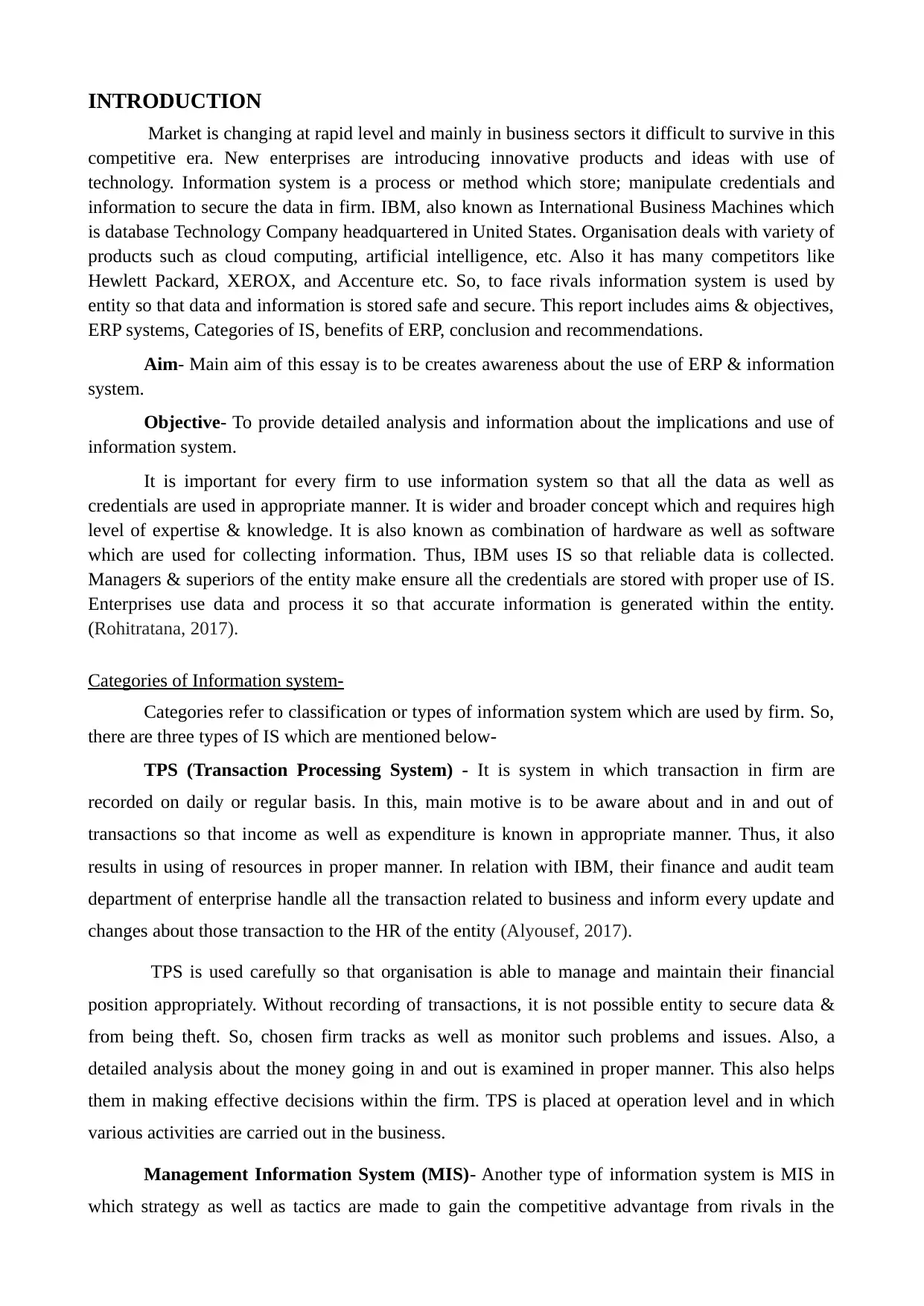
INTRODUCTION
Market is changing at rapid level and mainly in business sectors it difficult to survive in this
competitive era. New enterprises are introducing innovative products and ideas with use of
technology. Information system is a process or method which store; manipulate credentials and
information to secure the data in firm. IBM, also known as International Business Machines which
is database Technology Company headquartered in United States. Organisation deals with variety of
products such as cloud computing, artificial intelligence, etc. Also it has many competitors like
Hewlett Packard, XEROX, and Accenture etc. So, to face rivals information system is used by
entity so that data and information is stored safe and secure. This report includes aims & objectives,
ERP systems, Categories of IS, benefits of ERP, conclusion and recommendations.
Aim- Main aim of this essay is to be creates awareness about the use of ERP & information
system.
Objective- To provide detailed analysis and information about the implications and use of
information system.
It is important for every firm to use information system so that all the data as well as
credentials are used in appropriate manner. It is wider and broader concept which and requires high
level of expertise & knowledge. It is also known as combination of hardware as well as software
which are used for collecting information. Thus, IBM uses IS so that reliable data is collected.
Managers & superiors of the entity make ensure all the credentials are stored with proper use of IS.
Enterprises use data and process it so that accurate information is generated within the entity.
(Rohitratana, 2017).
Categories of Information system-
Categories refer to classification or types of information system which are used by firm. So,
there are three types of IS which are mentioned below-
TPS (Transaction Processing System) - It is system in which transaction in firm are
recorded on daily or regular basis. In this, main motive is to be aware about and in and out of
transactions so that income as well as expenditure is known in appropriate manner. Thus, it also
results in using of resources in proper manner. In relation with IBM, their finance and audit team
department of enterprise handle all the transaction related to business and inform every update and
changes about those transaction to the HR of the entity (Alyousef, 2017).
TPS is used carefully so that organisation is able to manage and maintain their financial
position appropriately. Without recording of transactions, it is not possible entity to secure data &
from being theft. So, chosen firm tracks as well as monitor such problems and issues. Also, a
detailed analysis about the money going in and out is examined in proper manner. This also helps
them in making effective decisions within the firm. TPS is placed at operation level and in which
various activities are carried out in the business.
Management Information System (MIS)- Another type of information system is MIS in
which strategy as well as tactics are made to gain the competitive advantage from rivals in the
Market is changing at rapid level and mainly in business sectors it difficult to survive in this
competitive era. New enterprises are introducing innovative products and ideas with use of
technology. Information system is a process or method which store; manipulate credentials and
information to secure the data in firm. IBM, also known as International Business Machines which
is database Technology Company headquartered in United States. Organisation deals with variety of
products such as cloud computing, artificial intelligence, etc. Also it has many competitors like
Hewlett Packard, XEROX, and Accenture etc. So, to face rivals information system is used by
entity so that data and information is stored safe and secure. This report includes aims & objectives,
ERP systems, Categories of IS, benefits of ERP, conclusion and recommendations.
Aim- Main aim of this essay is to be creates awareness about the use of ERP & information
system.
Objective- To provide detailed analysis and information about the implications and use of
information system.
It is important for every firm to use information system so that all the data as well as
credentials are used in appropriate manner. It is wider and broader concept which and requires high
level of expertise & knowledge. It is also known as combination of hardware as well as software
which are used for collecting information. Thus, IBM uses IS so that reliable data is collected.
Managers & superiors of the entity make ensure all the credentials are stored with proper use of IS.
Enterprises use data and process it so that accurate information is generated within the entity.
(Rohitratana, 2017).
Categories of Information system-
Categories refer to classification or types of information system which are used by firm. So,
there are three types of IS which are mentioned below-
TPS (Transaction Processing System) - It is system in which transaction in firm are
recorded on daily or regular basis. In this, main motive is to be aware about and in and out of
transactions so that income as well as expenditure is known in appropriate manner. Thus, it also
results in using of resources in proper manner. In relation with IBM, their finance and audit team
department of enterprise handle all the transaction related to business and inform every update and
changes about those transaction to the HR of the entity (Alyousef, 2017).
TPS is used carefully so that organisation is able to manage and maintain their financial
position appropriately. Without recording of transactions, it is not possible entity to secure data &
from being theft. So, chosen firm tracks as well as monitor such problems and issues. Also, a
detailed analysis about the money going in and out is examined in proper manner. This also helps
them in making effective decisions within the firm. TPS is placed at operation level and in which
various activities are carried out in the business.
Management Information System (MIS)- Another type of information system is MIS in
which strategy as well as tactics are made to gain the competitive advantage from rivals in the
⊘ This is a preview!⊘
Do you want full access?
Subscribe today to unlock all pages.

Trusted by 1+ million students worldwide
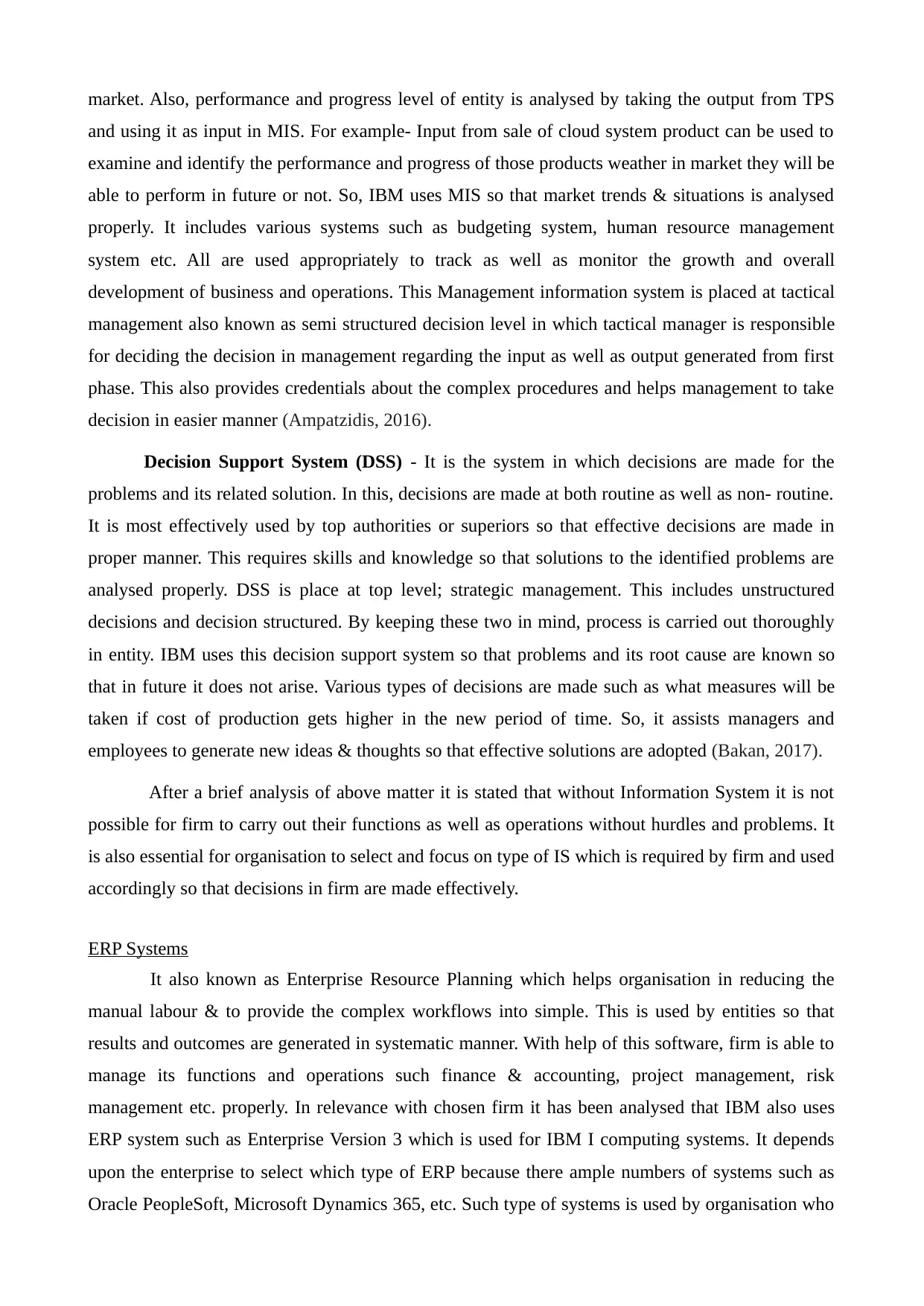
market. Also, performance and progress level of entity is analysed by taking the output from TPS
and using it as input in MIS. For example- Input from sale of cloud system product can be used to
examine and identify the performance and progress of those products weather in market they will be
able to perform in future or not. So, IBM uses MIS so that market trends & situations is analysed
properly. It includes various systems such as budgeting system, human resource management
system etc. All are used appropriately to track as well as monitor the growth and overall
development of business and operations. This Management information system is placed at tactical
management also known as semi structured decision level in which tactical manager is responsible
for deciding the decision in management regarding the input as well as output generated from first
phase. This also provides credentials about the complex procedures and helps management to take
decision in easier manner (Ampatzidis, 2016).
Decision Support System (DSS) - It is the system in which decisions are made for the
problems and its related solution. In this, decisions are made at both routine as well as non- routine.
It is most effectively used by top authorities or superiors so that effective decisions are made in
proper manner. This requires skills and knowledge so that solutions to the identified problems are
analysed properly. DSS is place at top level; strategic management. This includes unstructured
decisions and decision structured. By keeping these two in mind, process is carried out thoroughly
in entity. IBM uses this decision support system so that problems and its root cause are known so
that in future it does not arise. Various types of decisions are made such as what measures will be
taken if cost of production gets higher in the new period of time. So, it assists managers and
employees to generate new ideas & thoughts so that effective solutions are adopted (Bakan, 2017).
After a brief analysis of above matter it is stated that without Information System it is not
possible for firm to carry out their functions as well as operations without hurdles and problems. It
is also essential for organisation to select and focus on type of IS which is required by firm and used
accordingly so that decisions in firm are made effectively.
ERP Systems
It also known as Enterprise Resource Planning which helps organisation in reducing the
manual labour & to provide the complex workflows into simple. This is used by entities so that
results and outcomes are generated in systematic manner. With help of this software, firm is able to
manage its functions and operations such finance & accounting, project management, risk
management etc. properly. In relevance with chosen firm it has been analysed that IBM also uses
ERP system such as Enterprise Version 3 which is used for IBM I computing systems. It depends
upon the enterprise to select which type of ERP because there ample numbers of systems such as
Oracle PeopleSoft, Microsoft Dynamics 365, etc. Such type of systems is used by organisation who
and using it as input in MIS. For example- Input from sale of cloud system product can be used to
examine and identify the performance and progress of those products weather in market they will be
able to perform in future or not. So, IBM uses MIS so that market trends & situations is analysed
properly. It includes various systems such as budgeting system, human resource management
system etc. All are used appropriately to track as well as monitor the growth and overall
development of business and operations. This Management information system is placed at tactical
management also known as semi structured decision level in which tactical manager is responsible
for deciding the decision in management regarding the input as well as output generated from first
phase. This also provides credentials about the complex procedures and helps management to take
decision in easier manner (Ampatzidis, 2016).
Decision Support System (DSS) - It is the system in which decisions are made for the
problems and its related solution. In this, decisions are made at both routine as well as non- routine.
It is most effectively used by top authorities or superiors so that effective decisions are made in
proper manner. This requires skills and knowledge so that solutions to the identified problems are
analysed properly. DSS is place at top level; strategic management. This includes unstructured
decisions and decision structured. By keeping these two in mind, process is carried out thoroughly
in entity. IBM uses this decision support system so that problems and its root cause are known so
that in future it does not arise. Various types of decisions are made such as what measures will be
taken if cost of production gets higher in the new period of time. So, it assists managers and
employees to generate new ideas & thoughts so that effective solutions are adopted (Bakan, 2017).
After a brief analysis of above matter it is stated that without Information System it is not
possible for firm to carry out their functions as well as operations without hurdles and problems. It
is also essential for organisation to select and focus on type of IS which is required by firm and used
accordingly so that decisions in firm are made effectively.
ERP Systems
It also known as Enterprise Resource Planning which helps organisation in reducing the
manual labour & to provide the complex workflows into simple. This is used by entities so that
results and outcomes are generated in systematic manner. With help of this software, firm is able to
manage its functions and operations such finance & accounting, project management, risk
management etc. properly. In relevance with chosen firm it has been analysed that IBM also uses
ERP system such as Enterprise Version 3 which is used for IBM I computing systems. It depends
upon the enterprise to select which type of ERP because there ample numbers of systems such as
Oracle PeopleSoft, Microsoft Dynamics 365, etc. Such type of systems is used by organisation who
Paraphrase This Document
Need a fresh take? Get an instant paraphrase of this document with our AI Paraphraser
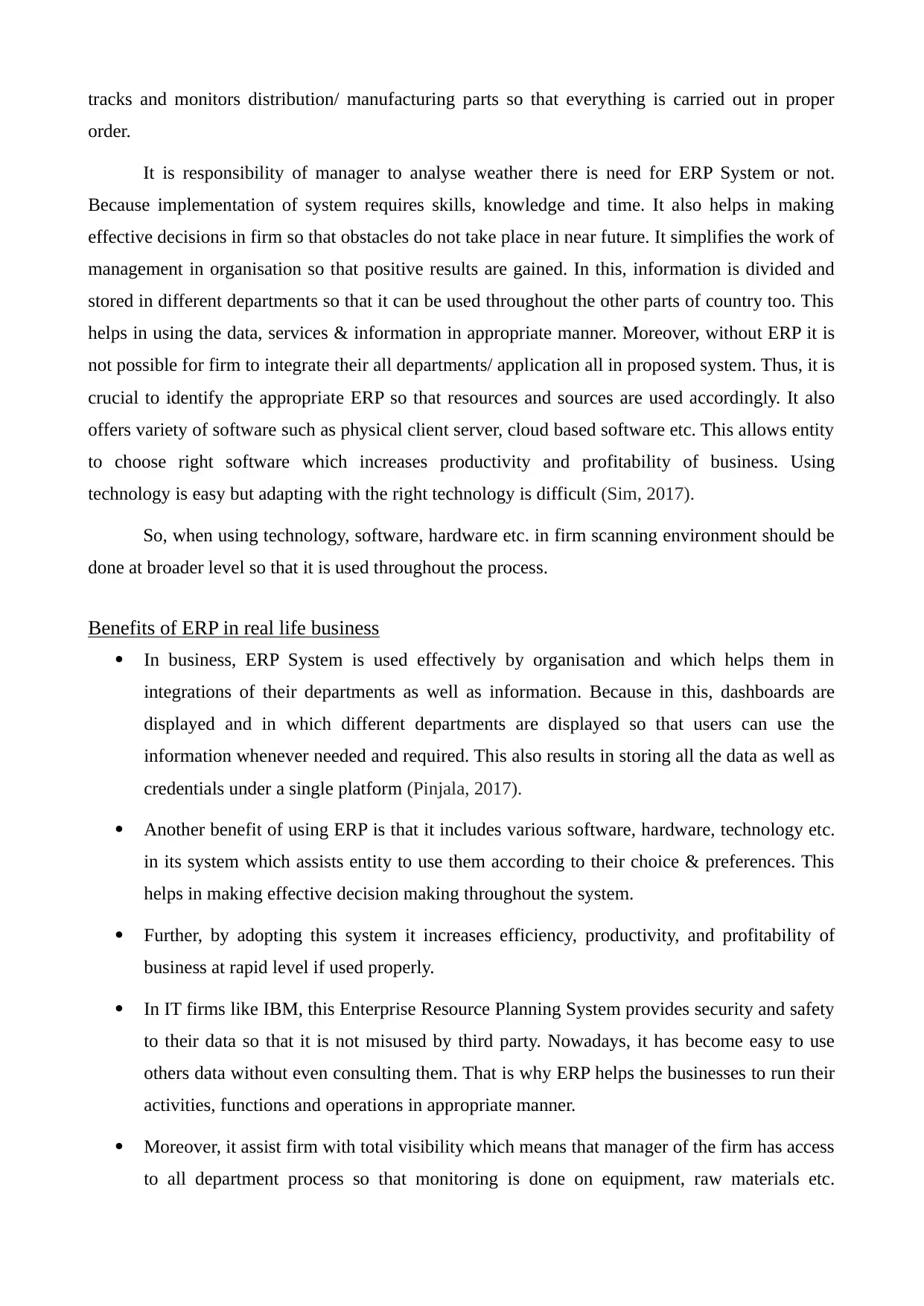
tracks and monitors distribution/ manufacturing parts so that everything is carried out in proper
order.
It is responsibility of manager to analyse weather there is need for ERP System or not.
Because implementation of system requires skills, knowledge and time. It also helps in making
effective decisions in firm so that obstacles do not take place in near future. It simplifies the work of
management in organisation so that positive results are gained. In this, information is divided and
stored in different departments so that it can be used throughout the other parts of country too. This
helps in using the data, services & information in appropriate manner. Moreover, without ERP it is
not possible for firm to integrate their all departments/ application all in proposed system. Thus, it is
crucial to identify the appropriate ERP so that resources and sources are used accordingly. It also
offers variety of software such as physical client server, cloud based software etc. This allows entity
to choose right software which increases productivity and profitability of business. Using
technology is easy but adapting with the right technology is difficult (Sim, 2017).
So, when using technology, software, hardware etc. in firm scanning environment should be
done at broader level so that it is used throughout the process.
Benefits of ERP in real life business
In business, ERP System is used effectively by organisation and which helps them in
integrations of their departments as well as information. Because in this, dashboards are
displayed and in which different departments are displayed so that users can use the
information whenever needed and required. This also results in storing all the data as well as
credentials under a single platform (Pinjala, 2017).
Another benefit of using ERP is that it includes various software, hardware, technology etc.
in its system which assists entity to use them according to their choice & preferences. This
helps in making effective decision making throughout the system.
Further, by adopting this system it increases efficiency, productivity, and profitability of
business at rapid level if used properly.
In IT firms like IBM, this Enterprise Resource Planning System provides security and safety
to their data so that it is not misused by third party. Nowadays, it has become easy to use
others data without even consulting them. That is why ERP helps the businesses to run their
activities, functions and operations in appropriate manner.
Moreover, it assist firm with total visibility which means that manager of the firm has access
to all department process so that monitoring is done on equipment, raw materials etc.
order.
It is responsibility of manager to analyse weather there is need for ERP System or not.
Because implementation of system requires skills, knowledge and time. It also helps in making
effective decisions in firm so that obstacles do not take place in near future. It simplifies the work of
management in organisation so that positive results are gained. In this, information is divided and
stored in different departments so that it can be used throughout the other parts of country too. This
helps in using the data, services & information in appropriate manner. Moreover, without ERP it is
not possible for firm to integrate their all departments/ application all in proposed system. Thus, it is
crucial to identify the appropriate ERP so that resources and sources are used accordingly. It also
offers variety of software such as physical client server, cloud based software etc. This allows entity
to choose right software which increases productivity and profitability of business. Using
technology is easy but adapting with the right technology is difficult (Sim, 2017).
So, when using technology, software, hardware etc. in firm scanning environment should be
done at broader level so that it is used throughout the process.
Benefits of ERP in real life business
In business, ERP System is used effectively by organisation and which helps them in
integrations of their departments as well as information. Because in this, dashboards are
displayed and in which different departments are displayed so that users can use the
information whenever needed and required. This also results in storing all the data as well as
credentials under a single platform (Pinjala, 2017).
Another benefit of using ERP is that it includes various software, hardware, technology etc.
in its system which assists entity to use them according to their choice & preferences. This
helps in making effective decision making throughout the system.
Further, by adopting this system it increases efficiency, productivity, and profitability of
business at rapid level if used properly.
In IT firms like IBM, this Enterprise Resource Planning System provides security and safety
to their data so that it is not misused by third party. Nowadays, it has become easy to use
others data without even consulting them. That is why ERP helps the businesses to run their
activities, functions and operations in appropriate manner.
Moreover, it assist firm with total visibility which means that manager of the firm has access
to all department process so that monitoring is done on equipment, raw materials etc.
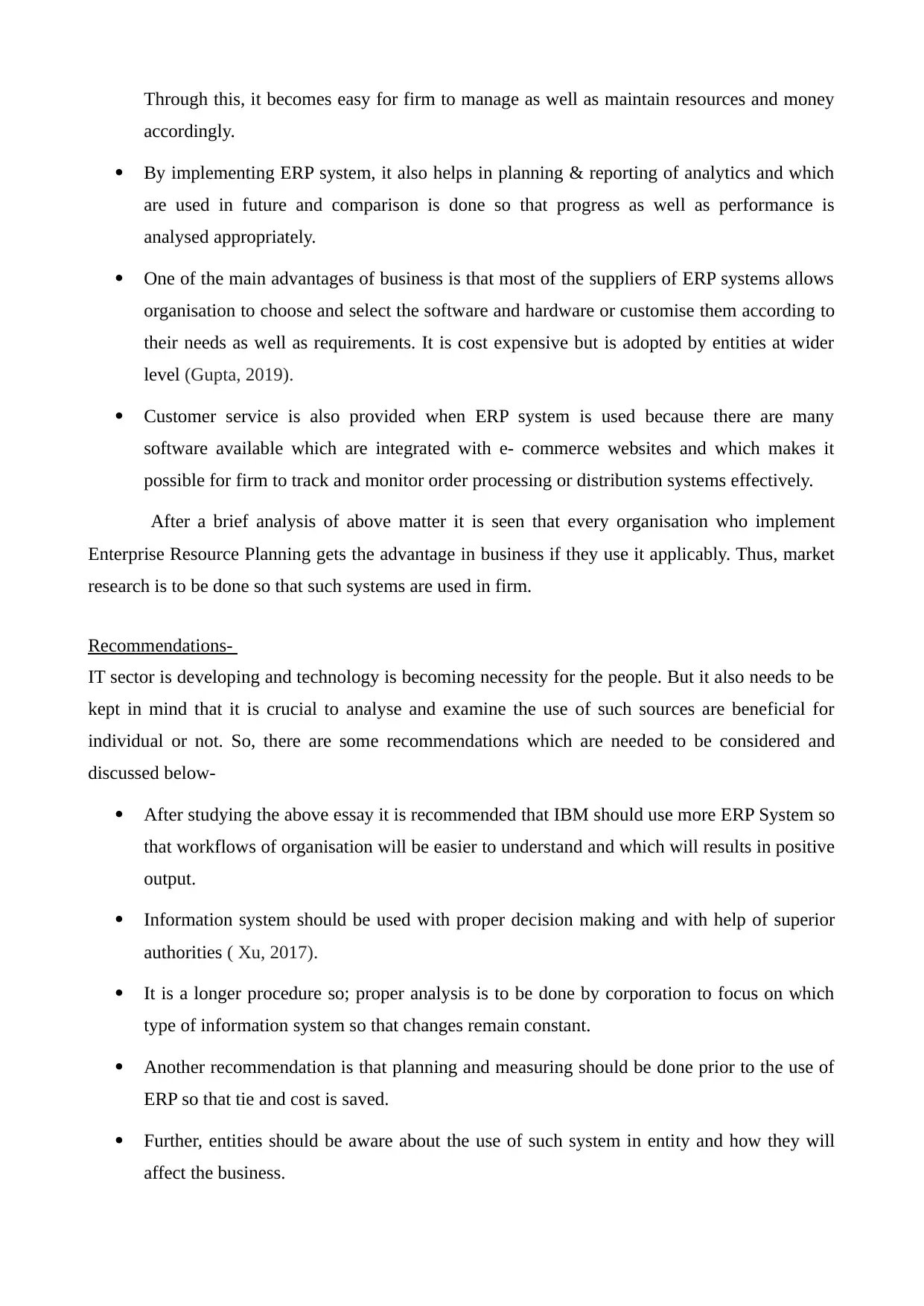
Through this, it becomes easy for firm to manage as well as maintain resources and money
accordingly.
By implementing ERP system, it also helps in planning & reporting of analytics and which
are used in future and comparison is done so that progress as well as performance is
analysed appropriately.
One of the main advantages of business is that most of the suppliers of ERP systems allows
organisation to choose and select the software and hardware or customise them according to
their needs as well as requirements. It is cost expensive but is adopted by entities at wider
level (Gupta, 2019).
Customer service is also provided when ERP system is used because there are many
software available which are integrated with e- commerce websites and which makes it
possible for firm to track and monitor order processing or distribution systems effectively.
After a brief analysis of above matter it is seen that every organisation who implement
Enterprise Resource Planning gets the advantage in business if they use it applicably. Thus, market
research is to be done so that such systems are used in firm.
Recommendations-
IT sector is developing and technology is becoming necessity for the people. But it also needs to be
kept in mind that it is crucial to analyse and examine the use of such sources are beneficial for
individual or not. So, there are some recommendations which are needed to be considered and
discussed below-
After studying the above essay it is recommended that IBM should use more ERP System so
that workflows of organisation will be easier to understand and which will results in positive
output.
Information system should be used with proper decision making and with help of superior
authorities ( Xu, 2017).
It is a longer procedure so; proper analysis is to be done by corporation to focus on which
type of information system so that changes remain constant.
Another recommendation is that planning and measuring should be done prior to the use of
ERP so that tie and cost is saved.
Further, entities should be aware about the use of such system in entity and how they will
affect the business.
accordingly.
By implementing ERP system, it also helps in planning & reporting of analytics and which
are used in future and comparison is done so that progress as well as performance is
analysed appropriately.
One of the main advantages of business is that most of the suppliers of ERP systems allows
organisation to choose and select the software and hardware or customise them according to
their needs as well as requirements. It is cost expensive but is adopted by entities at wider
level (Gupta, 2019).
Customer service is also provided when ERP system is used because there are many
software available which are integrated with e- commerce websites and which makes it
possible for firm to track and monitor order processing or distribution systems effectively.
After a brief analysis of above matter it is seen that every organisation who implement
Enterprise Resource Planning gets the advantage in business if they use it applicably. Thus, market
research is to be done so that such systems are used in firm.
Recommendations-
IT sector is developing and technology is becoming necessity for the people. But it also needs to be
kept in mind that it is crucial to analyse and examine the use of such sources are beneficial for
individual or not. So, there are some recommendations which are needed to be considered and
discussed below-
After studying the above essay it is recommended that IBM should use more ERP System so
that workflows of organisation will be easier to understand and which will results in positive
output.
Information system should be used with proper decision making and with help of superior
authorities ( Xu, 2017).
It is a longer procedure so; proper analysis is to be done by corporation to focus on which
type of information system so that changes remain constant.
Another recommendation is that planning and measuring should be done prior to the use of
ERP so that tie and cost is saved.
Further, entities should be aware about the use of such system in entity and how they will
affect the business.
⊘ This is a preview!⊘
Do you want full access?
Subscribe today to unlock all pages.

Trusted by 1+ million students worldwide
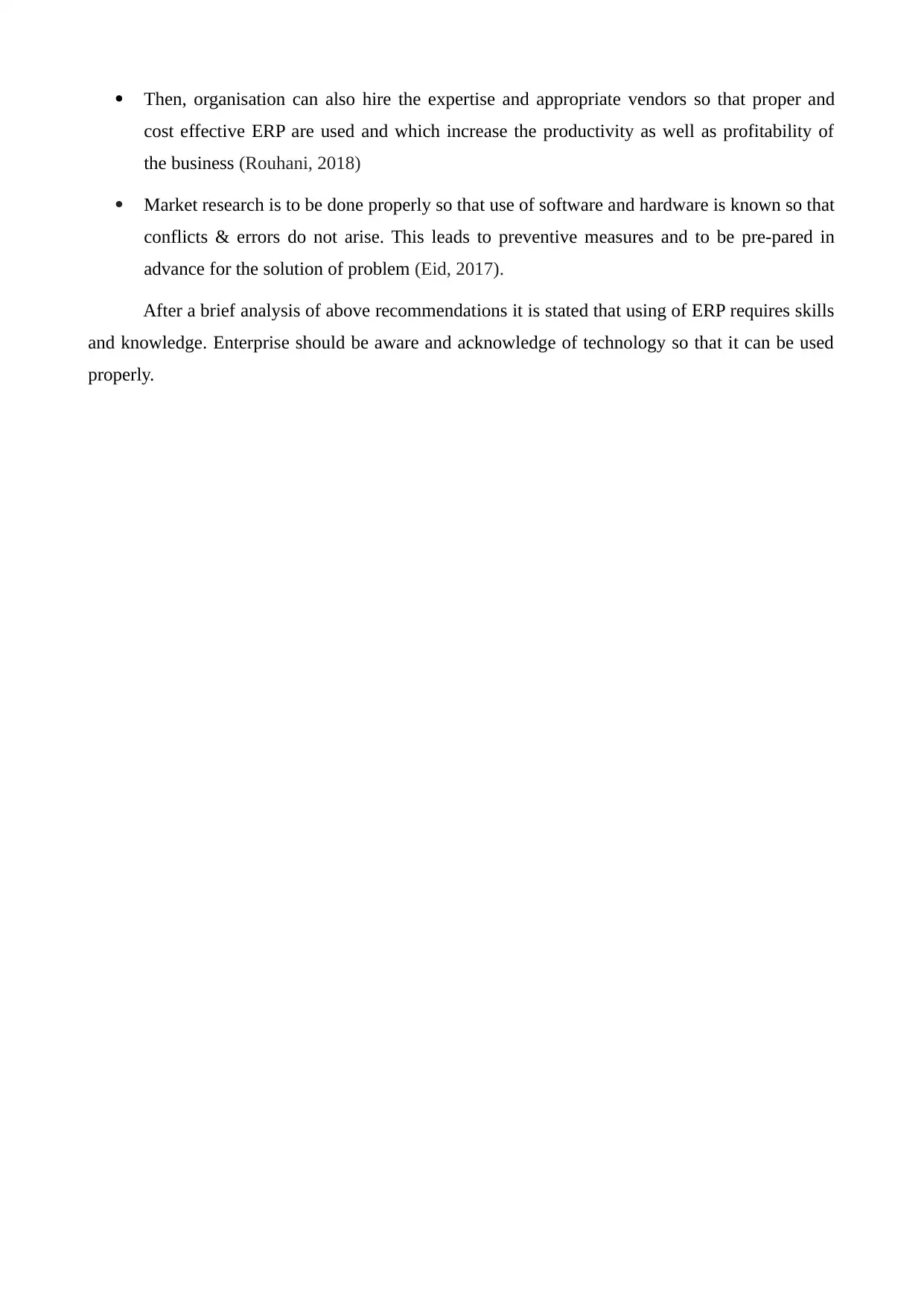
Then, organisation can also hire the expertise and appropriate vendors so that proper and
cost effective ERP are used and which increase the productivity as well as profitability of
the business (Rouhani, 2018)
Market research is to be done properly so that use of software and hardware is known so that
conflicts & errors do not arise. This leads to preventive measures and to be pre-pared in
advance for the solution of problem (Eid, 2017).
After a brief analysis of above recommendations it is stated that using of ERP requires skills
and knowledge. Enterprise should be aware and acknowledge of technology so that it can be used
properly.
cost effective ERP are used and which increase the productivity as well as profitability of
the business (Rouhani, 2018)
Market research is to be done properly so that use of software and hardware is known so that
conflicts & errors do not arise. This leads to preventive measures and to be pre-pared in
advance for the solution of problem (Eid, 2017).
After a brief analysis of above recommendations it is stated that using of ERP requires skills
and knowledge. Enterprise should be aware and acknowledge of technology so that it can be used
properly.
Paraphrase This Document
Need a fresh take? Get an instant paraphrase of this document with our AI Paraphraser
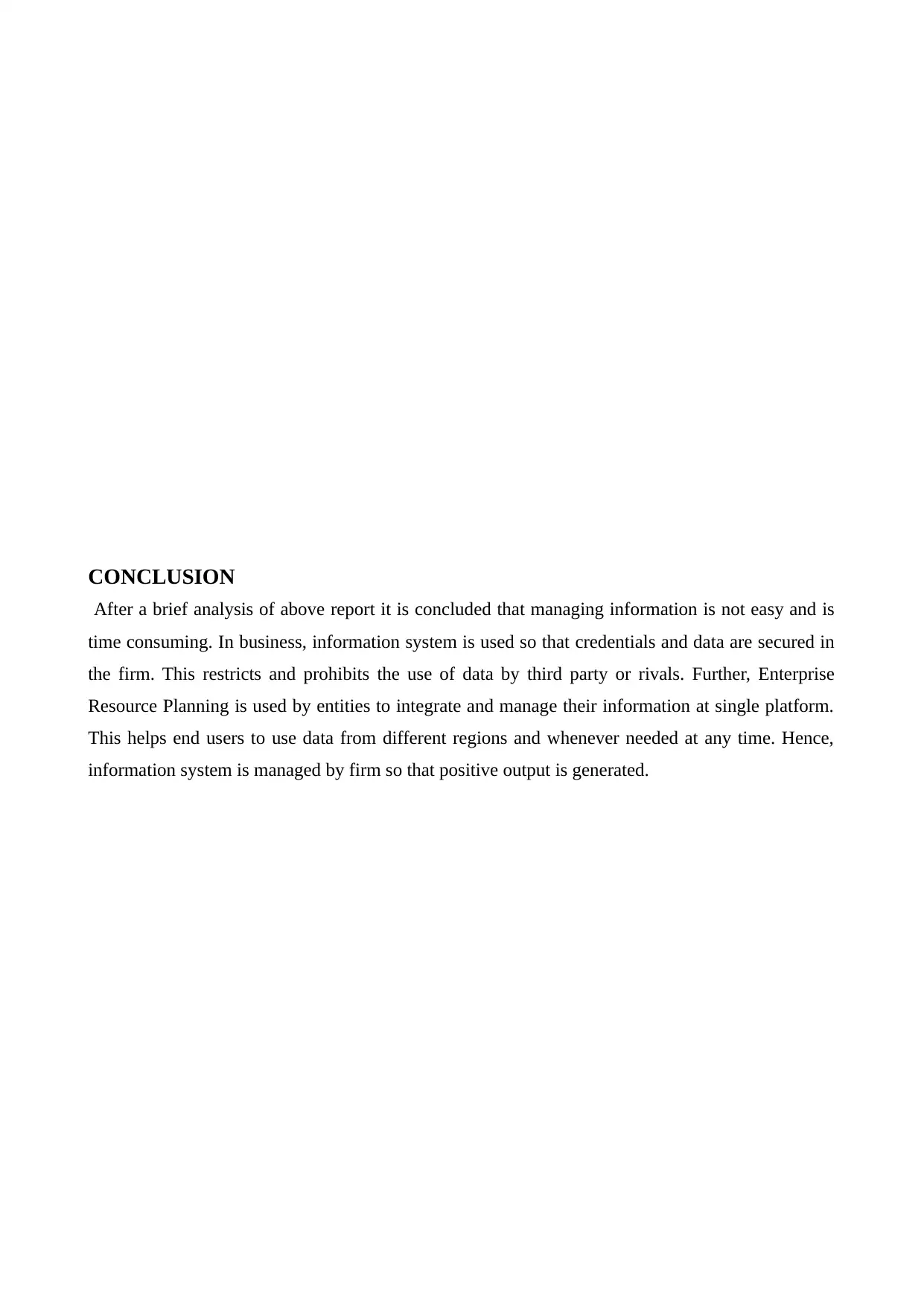
CONCLUSION
After a brief analysis of above report it is concluded that managing information is not easy and is
time consuming. In business, information system is used so that credentials and data are secured in
the firm. This restricts and prohibits the use of data by third party or rivals. Further, Enterprise
Resource Planning is used by entities to integrate and manage their information at single platform.
This helps end users to use data from different regions and whenever needed at any time. Hence,
information system is managed by firm so that positive output is generated.
After a brief analysis of above report it is concluded that managing information is not easy and is
time consuming. In business, information system is used so that credentials and data are secured in
the firm. This restricts and prohibits the use of data by third party or rivals. Further, Enterprise
Resource Planning is used by entities to integrate and manage their information at single platform.
This helps end users to use data from different regions and whenever needed at any time. Hence,
information system is managed by firm so that positive output is generated.
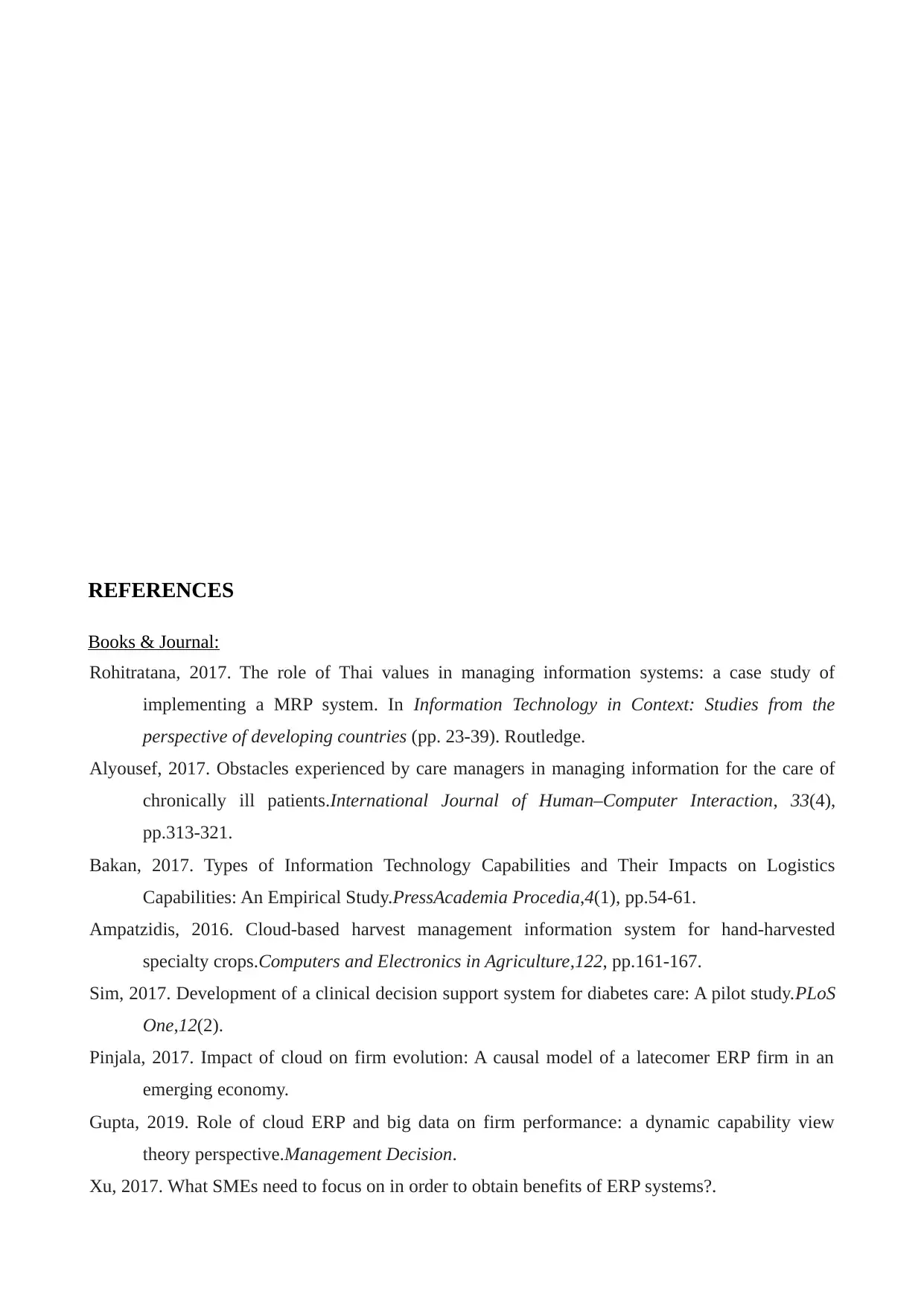
REFERENCES
Books & Journal:
Rohitratana, 2017. The role of Thai values in managing information systems: a case study of
implementing a MRP system. In Information Technology in Context: Studies from the
perspective of developing countries (pp. 23-39). Routledge.
Alyousef, 2017. Obstacles experienced by care managers in managing information for the care of
chronically ill patients.International Journal of Human–Computer Interaction, 33(4),
pp.313-321.
Bakan, 2017. Types of Information Technology Capabilities and Their Impacts on Logistics
Capabilities: An Empirical Study.PressAcademia Procedia,4(1), pp.54-61.
Ampatzidis, 2016. Cloud-based harvest management information system for hand-harvested
specialty crops.Computers and Electronics in Agriculture,122, pp.161-167.
Sim, 2017. Development of a clinical decision support system for diabetes care: A pilot study.PLoS
One,12(2).
Pinjala, 2017. Impact of cloud on firm evolution: A causal model of a latecomer ERP firm in an
emerging economy.
Gupta, 2019. Role of cloud ERP and big data on firm performance: a dynamic capability view
theory perspective.Management Decision.
Xu, 2017. What SMEs need to focus on in order to obtain benefits of ERP systems?.
Books & Journal:
Rohitratana, 2017. The role of Thai values in managing information systems: a case study of
implementing a MRP system. In Information Technology in Context: Studies from the
perspective of developing countries (pp. 23-39). Routledge.
Alyousef, 2017. Obstacles experienced by care managers in managing information for the care of
chronically ill patients.International Journal of Human–Computer Interaction, 33(4),
pp.313-321.
Bakan, 2017. Types of Information Technology Capabilities and Their Impacts on Logistics
Capabilities: An Empirical Study.PressAcademia Procedia,4(1), pp.54-61.
Ampatzidis, 2016. Cloud-based harvest management information system for hand-harvested
specialty crops.Computers and Electronics in Agriculture,122, pp.161-167.
Sim, 2017. Development of a clinical decision support system for diabetes care: A pilot study.PLoS
One,12(2).
Pinjala, 2017. Impact of cloud on firm evolution: A causal model of a latecomer ERP firm in an
emerging economy.
Gupta, 2019. Role of cloud ERP and big data on firm performance: a dynamic capability view
theory perspective.Management Decision.
Xu, 2017. What SMEs need to focus on in order to obtain benefits of ERP systems?.
⊘ This is a preview!⊘
Do you want full access?
Subscribe today to unlock all pages.

Trusted by 1+ million students worldwide
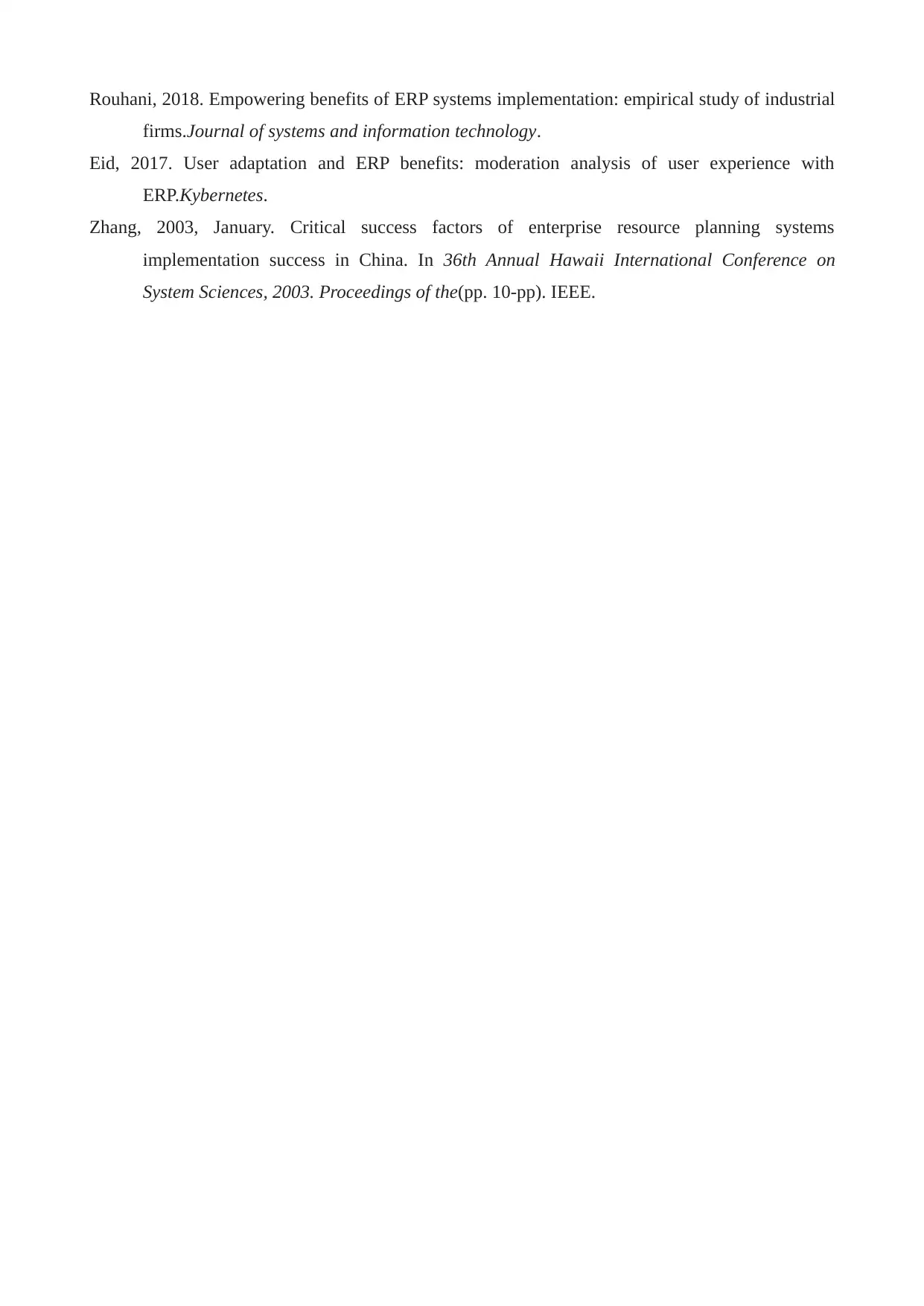
Rouhani, 2018. Empowering benefits of ERP systems implementation: empirical study of industrial
firms.Journal of systems and information technology.
Eid, 2017. User adaptation and ERP benefits: moderation analysis of user experience with
ERP.Kybernetes.
Zhang, 2003, January. Critical success factors of enterprise resource planning systems
implementation success in China. In 36th Annual Hawaii International Conference on
System Sciences, 2003. Proceedings of the(pp. 10-pp). IEEE.
firms.Journal of systems and information technology.
Eid, 2017. User adaptation and ERP benefits: moderation analysis of user experience with
ERP.Kybernetes.
Zhang, 2003, January. Critical success factors of enterprise resource planning systems
implementation success in China. In 36th Annual Hawaii International Conference on
System Sciences, 2003. Proceedings of the(pp. 10-pp). IEEE.
1 out of 10
Related Documents
Your All-in-One AI-Powered Toolkit for Academic Success.
+13062052269
info@desklib.com
Available 24*7 on WhatsApp / Email
![[object Object]](/_next/static/media/star-bottom.7253800d.svg)
Unlock your academic potential
Copyright © 2020–2026 A2Z Services. All Rights Reserved. Developed and managed by ZUCOL.





